Manners for Kids: Having Good Manners is an Incredibly Important Life Skill
It’s hard, but developing your kids’ manners beyond Please & Thank You is critical.
And like so many other things, getting kids into the habit of using manners at an early age makes things much easier in the long haul.
As my kids age and begin to play away from home and interact with teachers and parents, I’m noticing that they don’t always use eye contact when speaking with others and they often forget to say “excuse me.”
I’ve also noticed that simply telling them to practice these good manners isn’t enough.
To develop good manners in kids, they need to know why this is important for them.
When I explain the why behind certain manners, their eyes light up with comprehension. “Ohhhh,” they say. “Okay!” And they begin to practice it.
To start working on good manners for kids, try to model the kinds of behavior you want to see in your children.
Trust me—they are paying attention. (Even when you don’t want them to!)
Table of Contents
13 Examples of Good Manners for Kids
Here are what I consider to be the 11 most important manners for kids and my reasons WHY they are important.
While many of these seem like common sense, kids don’t know what’s expected of them until you explain it.
Make your expectations clear, and then model it yourself so they can see these good manners for kids in action.
1) Say please. This shows consideration for others.
2) Say thank you. This demonstrates appreciation and gratitude.
3) Look people in the eye when you speak to them. It’s a good way to show respect for the other person. (**Please note that neurodivergent people struggle with eye contact. It’s smart to teach kids that not all adults will hold eye contact. It’s also wise to observe your child to see if they don’t maintain eye contact because they are simply unable to.)
4) Apologize & forgive when others apologize. It shows empathy and that you are taking responsibility for your actions.
5) Smile & have a good attitude. This makes everything better for yourself and others!
6) Make small talk. This is an important social skill for friendships and, later in life, getting and keeping a job.
7) Listen when others are talking. This shows respect and care for others.
8) Ask questions of others. This shows interest in others’ ideas and feelings.
9) Say excuse me. This shows consideration for others.
10) Look for opportunities to compliment others. This makes others feel good and helps with reciprocal relationships.
11) Share. This shows others you care, and helps you to think of others, makes you appreciate what you have.
12) Wait your turn. This shows consideration and is an important life skill.
13) Treat others the way you want to be treated. Covers all bases!
How to Teach Good Manners for Kids
Reinforcing good manners isn’t hard, but you have to be intentional about it.
Here are several ways to foster good manners for kids.
1) Cement Good Manners by Reading a Book About Manners
RECOMMENDED BOOKS TO HELP WITH MANNERS FOR KIDS
Some of my favorites include Please Say Please, Perfect Pigs, Dude, That’s Rude, Are You Quite Polite, The Berenstein Bears Forget Their Manners, and The Thingamajig Book of Manners.
Most should be available through your local library, bookstore, or using the linked images below.
Please Say Please
by Margery Cuyler
Reading Age: 3 – 5 years
Perfect Pigs: An Introduction to Manners
by Marc Brown
Reading Age: 2 – 8 years
Dude, That’s Rude!
by Pamela Espeland
Reading Age: 2 – 8 years
Are You Quite Polite
by Alan Katz
Reading Age: 2 – 8 years
The Berenstein Bears Forget Their Manners
by Stan Berenstain
Reading Age: 3 – 7 years
The Thingamajig Book of Manners
by Irene Keller
Reading Age: 6 – 8 years
2) Give Your Kids “The Talk”
Before going to school, the store, a friend’s house, or relatives’ house, emphasize the manners for kids that you expect them to follow.
It sounds basic, but a quick reminder about what your expectations are for behavior can go a long way!
3) Create your own list of family manners
Focus on the ones that are important for your own family.
State them in a positive way and post them somewhere as a reminder for everyone.
4) Host a manners competition within your household
Have a marble jar or a sticker chart for every family member and give each other points for using good manners.
At the end of the week, let the winner pick dessert for the night, choose a fun family activity for the night, have the evening off from chores, or some other incentive of his or her choice.
5) Come up with a fun phrase or sound
Choose a sound to serve as a reminder for one another when manners are forgotten.
Some ideas: a buzzer sound, “rewind,” “oops, you forgot something,” or “let’s try that again.”
10 Things You Should Regularly Talk About With Your Kids
Regular communication between parents and kids is not only the key to good manners, but it’s also important for their safety and emotional health.
Over my many years of working as a school social worker and many years as a parent, I have come up with a list of 10 things that all parents really need to talk about with their kids.
Yes, there are probably more than 10 conversations you need to have with your child over the course of their lifetime, but these are the biggies.
Some of these topics will be a one-time thing, but many of them should be more ongoing.
1) Believe in Yourself
Self-confidence might be the most important factor in life success and overall happiness.
And no, I am not talking about the overconfident trash-talking kid (or coworker!) that we all know and love.
Kids need to be able to recognize their talents and positive qualities.
They need your help to discover these things. Take the time to tell them how proud you are. Point out their positive qualities. Tell them that you believe in them. This will help them to explore, take risks, and find success.
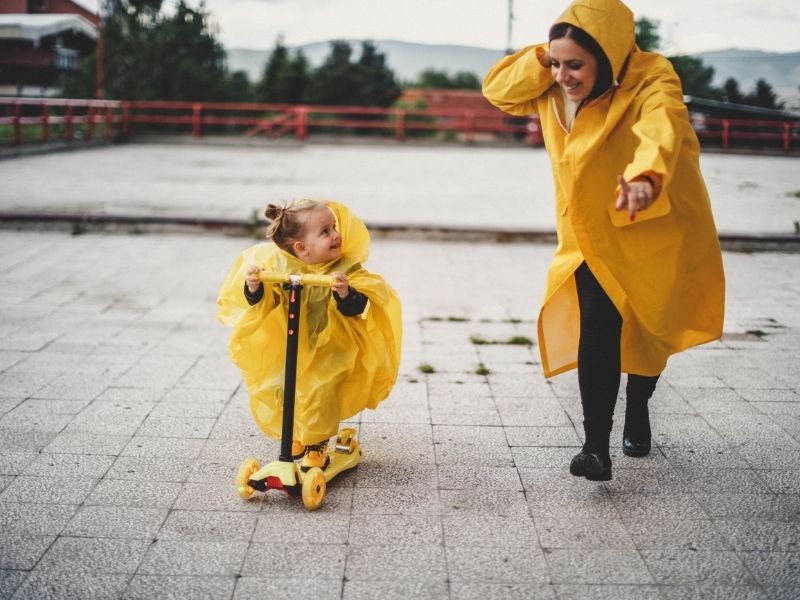
2) Appreciate What You Have
Whether you are super wealthy or barely getting by, it is important to remind your kids to be grateful for what they have.
My husband does a great job of pointing out the little things to our kids all the time. Warm pajamas, healthy food, bikes, great teachers, helpful neighbors, the ability to walk: all of these things are so easy to take for granted.
Help your kids notice the little things. Having an attitude of gratitude is contagious and makes you appreciate the little things.

3) Be Nice
While this may sound overly simple, it’s a great way to live.
I love wearing my “be nice” shirt. We even have a “be nice” sign on our wall at home.
It matters how you treat others.
Be nice to your siblings, be nice to your friends, and be nice to your parents. If you are nice to others, they will be nice to you. How…nice!
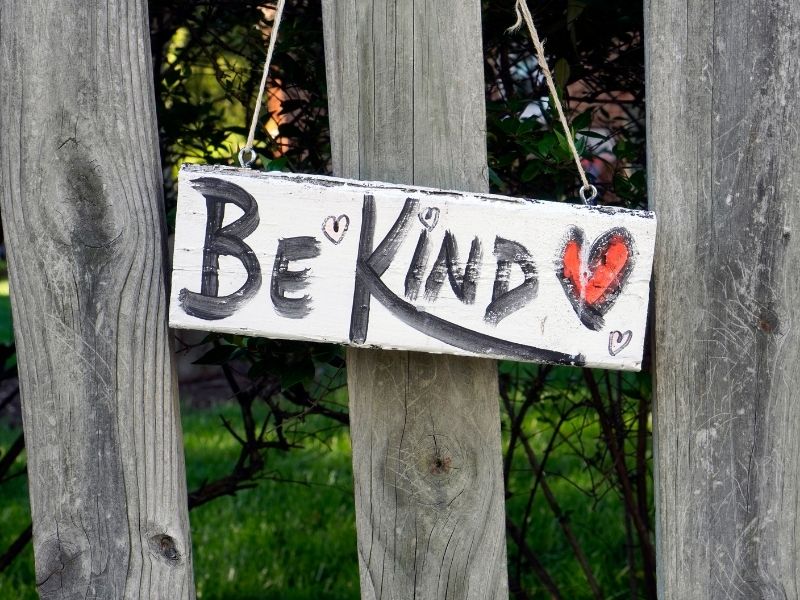
4) Be Safe
Regardless of your stance on guns, as soon as your kids start going to other people’s houses, you need to talk to them about gun safety.
Lots of people have guns in their homes and lots of people do not have them locked up. It is hard for children to understand how dangerous guns are. Tell them (more than once!) what they should do if one of their friends wants to show them a gun. Go through different “what if?” situations.
Teach them from a young age to listen to that little voice in their head. Tell them, “if something is telling you this doesn’t seem right, listen.” The same is true for alcohol, cigarettes, and a myriad of other scary and dangerous things.
It is important that your kids know what is acceptable and what is not and that you will always be proud of them for doing the right thing.
Make sure kids know your phone number and address!
5) Your Body Belongs to You
This one really ties in with the previous message about safety. While there are some discussions in elementary school classrooms about personal safety and good touch/bad touch, it’s not enough. Parents need to talk to kids about this, too.
Both boys and girls need to understand that their bodies are private and belong to them.
There is a very small group of people who should be allowed to see children naked.
Funny story: I forgot to mention to my kids that their pediatrician is someone who is on “the list” of approved people. My feisty little daughter just about kicked the poor doctor where it counts during her last well-child visit when he tried to pull her pants down a little bit to feel her belly. Oops!
If you’re wondering what unsafe situations for children look like, read this article about what constitutes abuse and when to report it.
6) Winning is Not That Important
We live in a competitive society. And let’s be honest, everyone likes to win more than they like to lose.
But winning isn’t the only point of competition. It breaks my heart to see kids in my son’s little league division (ages 9 and 10) already smashing bats on the ground, chucking gloves, and crying over a strikeout or a loss.
Allow your kids to lose at games and competitions (yes, I know that sounds mean) and teach them how to be a good sport.
Praise hard work, effort, and not throwing a fit when they lose.
Oh, and be a good example yourself!
7) Stand up for What You Know is Right
Teach your child to listen to that little voice in his or her head that tells them whether something is a good idea. And teach them to stick up for others who are being mistreated.
One of my proudest mom moments was when my 5-year-old daughter saw some kids being mean to her friend at the park and she marched right over to them, said, “You leave my friend alone!” and took her friend over to another part of the playground.
Do the right thing. Always.
8) Choose Good Friends
This is a tough one. Once your kids enter elementary school, they start to navigate the surprisingly tricky social world of childhood friendships.
I encourage my kids to have a lot of different friends.
While having a best friend sounds like a great idea, it’s really not when kids are young. Being completely wrapped up in one individual isn’t very healthy. If your child has a friend who they are getting into trouble with, try to get them to understand how that might not be good for them.
The more you can talk your kids through those situations (rather than telling them who they should and should not be friends with), the better off they will be in the long run (hopefully!).

9. Be Creative, Go Outside, Get Dirty
It saddens me to hear how many hours kids spend in front of screens. Video games have become a full-time job for so many.
While I enjoy playing the Wii as much as anyone (though my husband said I am about to be cut off because of my language when I play Mario Kart!), it’s important to have limits. Take a family walk or a bike ride. Have a picnic at the park. Let your kids play in the mud. Plant a garden. Go catch frogs. Finger paint. You get the idea.
Again, you have to set a good example for this.
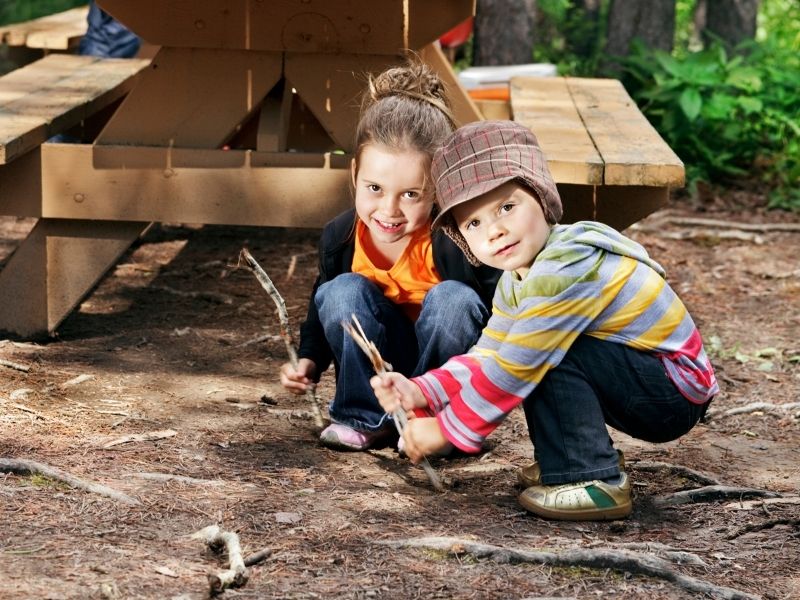
10) Do What You Can to Make Things Better in the World
While you shouldn’t expect your kids to be raising thousands of dollars for charity or volunteering every weekend, it’s never too early to plant the seed of doing good in the world.
If you give your kids allowance, have them save part of it in a giving jar. Offer to help a neighbor pull weeds. Pay it forward at the drive-thru. Stop to help someone who has dropped something. Again, when your kids see you doing good for others, they will do the same.
More Great Parenting Advice
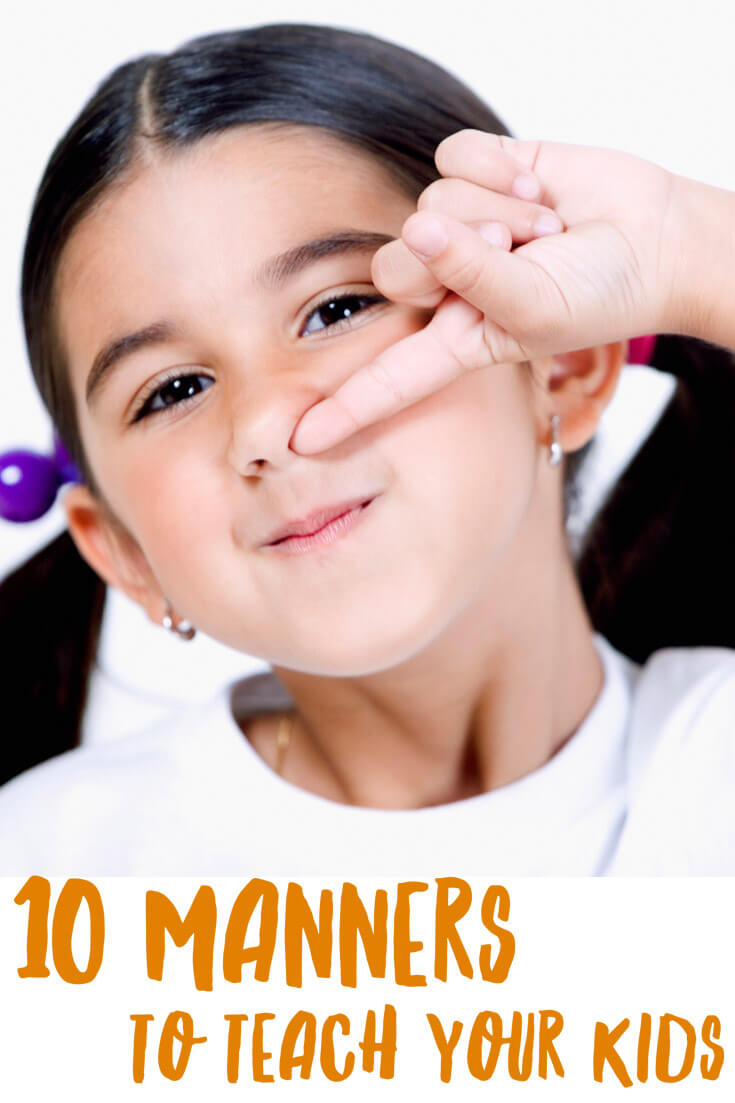


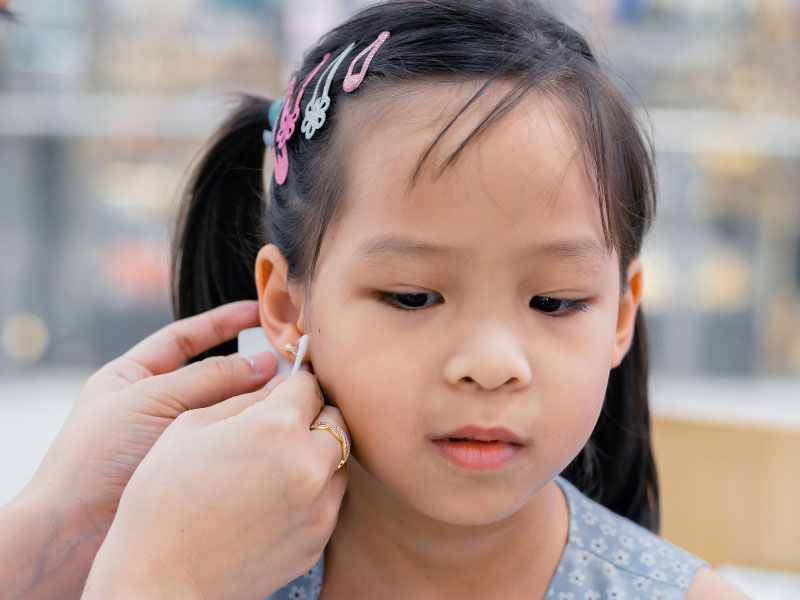


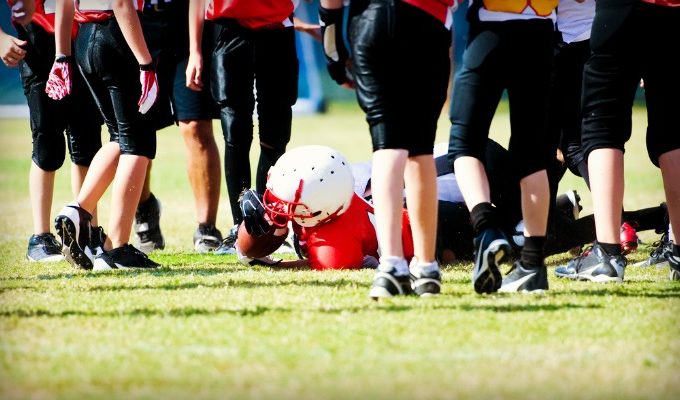

i love this
How about hold doors opened for people?
I love this blog! I’m so glad I found it. I’m raising my kids to be polite and respectful, and this blog is a great resource. Thanks!
nice
It’s great that you pointed out that it is important to model the behaviors that you want your children to have. I would imagine that at a certain age, children will start to notice that other kids sometimes will look different from them. It would be important to make sure that kids know how to treat others with kindness.
Here’s a huge one you failed to mention don’t touch things that don’t belong to you.
Ooh, yes! This is common knowledge, yet it is not talked about enough.
It’s great that you explained teaching your kids to be nice to others and they will be nice to you. My son was called to the principal’s office yesterday since he was bullying another child. We’ll remember these tips so we can teach him about being nice and how bullying can hurt kids.
Here’s one that doesn’t get enough attention. — Teach your kids that when they go over to a friends house, to acknowledge/greet the parents of your friend when they arrive and use their name using Mr. or Mrs. Shows respect.
When they leave do the same and tell your friend and his/her parents thank you.
I can’t tell you how many times, my kids friends would come over, eat, drink, play and then walk right past me and my husband like we didn’t exist. No social graces.
Pingback: 100 Easy Lessons to Teach Your Toddler
Pingback: 100 Easy Lessons to Teach Your Toddler | Nanny Websites
Pingback: Teaching Manners to Your Kids, 15 Blogs to Help!
Hey Kate,
This is great! May I please re-post this article in a monthly blog I do for parents at our church!